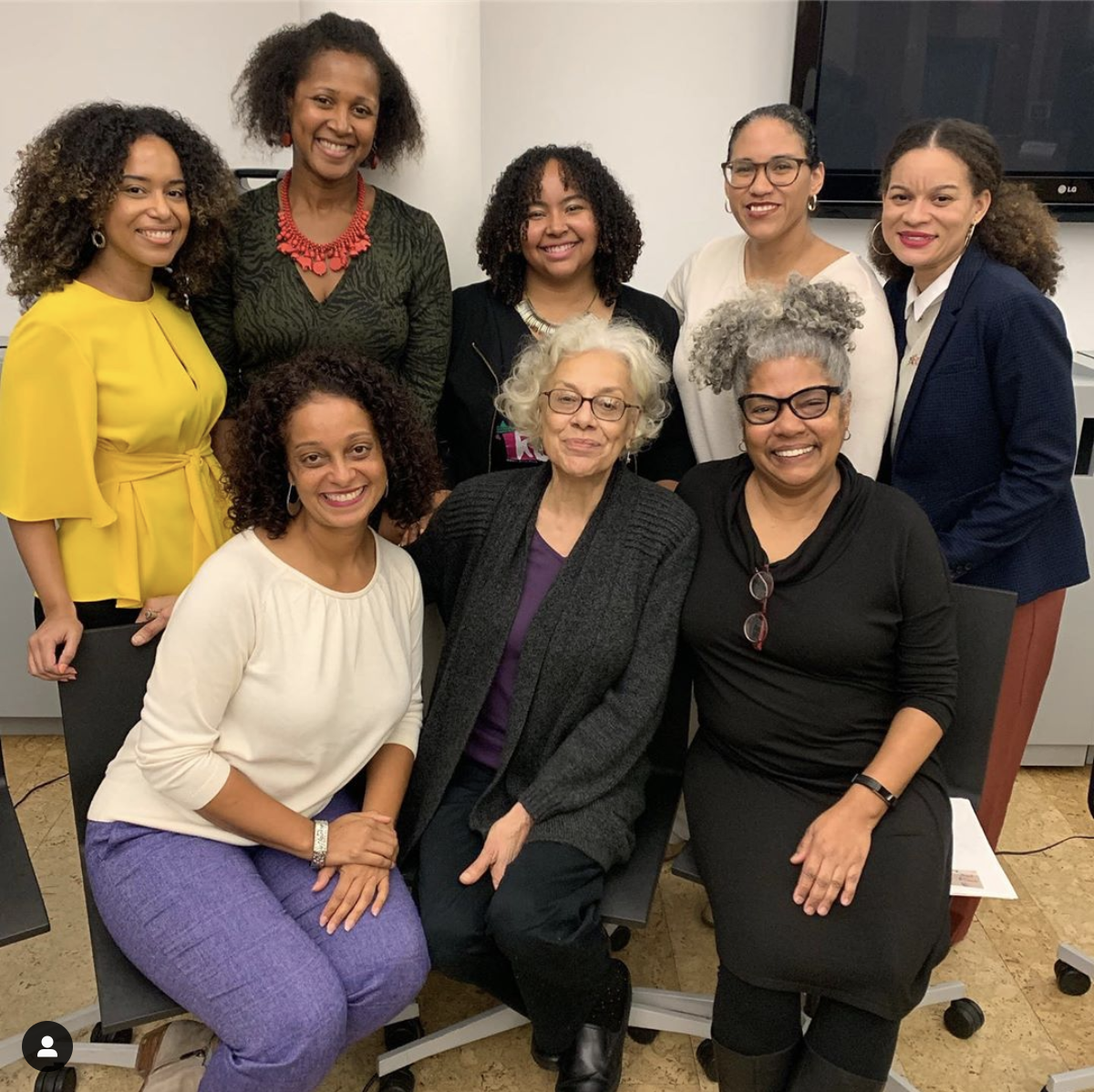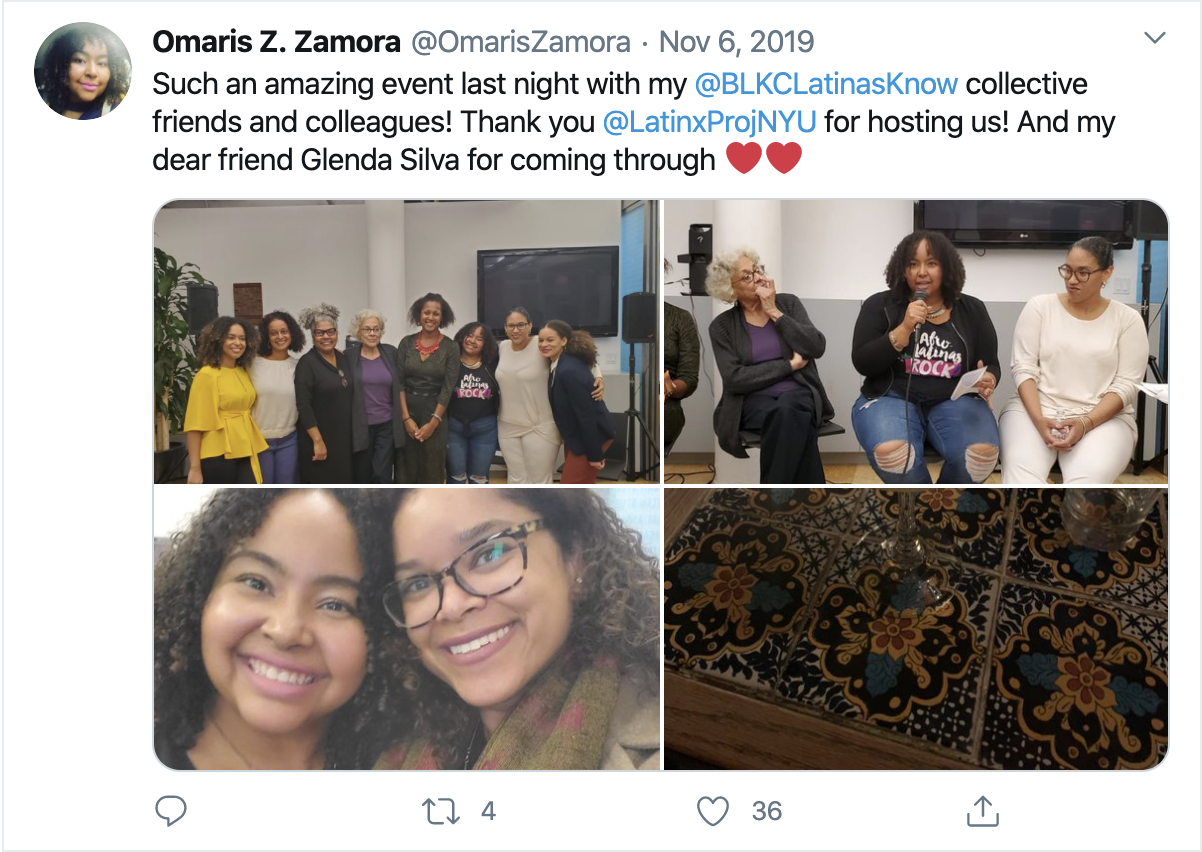In this interactive roundtable, members of the newly formed Black Latinas Know Collective (BLKC) discussed the BLKC Statement and the ways in which Black Latina scholars and their knowledge productions challenge and re-think Latinx Studies, Black Studies, Latin American and Caribbean Studies, and traditional social science and humanities disciplines.
Amarilys Estrella is a Ph.D. candidate in Anthropology at New York University. Her dissertation research examines the role of human rights law and discourse in transnational activism against anti-Black racism. She holds a Master’s in Latin America and Caribbean Studies from New York University. Amarilys is a 2018-2019 Public Humanities Fellow, working closely with the New York City-based collective We Are All Dominican (WAAD) in designing a transnational campaign to address the denationalization of Dominicans of Haitian descent in the Dominican Republic, as well as the global anti-immigrant and anti-Black sentiment. Prior to her doctoral studies, she was the Program Officer for Haiti and the Dominican Republic at American Jewish World Service, an international human rights organization
Dr. Danielle Pilar Clealand received her Ph.D. from the University of North Carolina at Chapel Hill in Political Science and joined the faculty at Florida International University in 2012. Her research examines comparative racial politics, group consciousness, black public opinion and racial inequality with a focus on the Spanish-speaking Caribbean and the United States. Dr. Clealand’s book, The Power of Race in Cuba: Racial Ideology and Black Consciousness During the Revolution, -winner of the 2018 Best Book Award from the Race, Ethnicity and Politics Section of the American Political Science Association- examines the racial ideology and the institutional mechanisms that support racial inequality in Cuba as well as Black public opinion. The book outlines structural racism the island and the experiences of discrimination that create a foundation for black solidarity. Through survey, ethnographic, and interview data, The Power of Race in Cuba draws from the many Black spaces on the island, both formal and informal, to highlight what constitutes black consciousness in Cuba.
Dr. Clealand’s current projects focus on racism and Black consciousness in Puerto Rico and political attitudes and identity among Afro-Latinos in the United States. Dr. Clealand teaches courses such as Caribbean Politics, Cuban Politics, Black Politics in the Americas, Latino Politics, and Race and Politics in the United States. She is the recipient of the McKnight Junior Faculty Fellowship for the 2017-2018 academic year. Before joining the faculty at Florida International University, she was a visiting fellow at the Department of African American Studies at Princeton University.
Professor Zaire Zenit Dinzey-Flores is an Associate Professor in the Department of Latino and Caribbean Studies and the Department of Sociology. Her research focuses on understanding how urban space mediates community life and race, class, and social inequality. She uses an interdisciplinary lens (sociology, urban planning, public policy), mixed-method approaches, and often a comparative Caribbean-U.S. framework, to investigate the processes that cement the built environment and unequally distribute power. She is particularly interested in housing and urban residential (housing and neighborhood) design: the underlying logic and policies that drive design, how design is interpreted, used, and experienced, and the consequences for inequality among communities and residents of cities. Her book, Locked In, Locked Out: Gated Communities in a Puerto Rican City (University Of Pennsylvania Press: 2013), winner of the 2014 Robert E. Park Award of the Community and Urban Sociology Section (CUSS) of the American Sociological Association and an Honorable Mention of the 2014 Frank Bonilla Book Award of the Puerto Rican Studies Association, examines race and class inequality as they are recreated, contained, and negotiated through urban policy, the physical built environment, and community gates in private and public housing.
Dinzey-Flores is currently working on two projects: the first is a mixed-method examination of how race is articulated in residential real estate practices in demographically changing neighborhoods in Brooklyn, NY; the second, look at the transatlantic circulation of housing planning and design ideals in the middle of the 20th Century. She is also collaborating on a mobile data project seeking to understand racial segregation as it occurs in motion and a mixed-media project on construction in the Caribbean.
Miriam Jiménez Roman, Executive Director of Afro Latin@ Forum; I’ve spent most of my life trying to reconcile the many spaces I inhabit as a Black Puerto Rican woman. Raised in the projects in East Harlem during the 1960s, I received all of my formal education in public schools and universities (mostly at Binghamton University) at a time when race and ethnic studies were being imagined and demanded. I owe my less formal but likely strongest intellectual, professional and personal development to the African diasporic community of scholars and activists whose work continues to inspire me. I taught my first course on the African presence in the Americas in 1991 while employed as exhibitions coordinator at The Schomburg Center for Research in Black Culture and where I subsequently served as assistant director of The Scholars in Residence program. Questioning accepted wisdom and pushing established boundaries between theory and practice, scholarship and activism, Latinidad and Blackness has permitted me to contribute to a broader acknowledgment of the Black Latin@ experience, most notably through the advocacy work of the AfroLatin@ Forum (2005) and the publication of The AfroLatin@ Reader: History and Culture in the United States (2010). I am also a co-editor of the AfroLatin@ Diasporas book series at Palgrave.
Maritza Quiñones, Academic Advisor, Anthropology, the University of Illinois at Urbana-Champaign; I am a Black Latina. I am originally from Carolina, Puerto Rico, a town with a strong Black history and silent stories. I am a first-generation college graduate who came to the U.S. mainland in 1980 (something). My experiences with race, gender, sexuality, and language in Puerto Rico and later at the university, in Indiana, led me to write. Silence and secrecy were for ever-present in my life, and writing became a way to share my voice. While in college, U.S. Black and Caribbean women writers helped me understand racism, violence, beauty, love, and the power of telling our stories as a form of pedagogy. As a graduate student, I wrote for an audience, who like me, was not represented in books. From Trigueñita to Afro-Puerto Rican: Intersections of the racialized, gendered, and sexualized body in Puerto Rico and the U.S. mainland represents a fusion of my experiences, academic journey, and hope for continued sharing. I am a proud Salsa music aficionado and a devout mother of two young adult Black Latinos.
Jomaira Salas Pujols, Ph.D. Student, Sociology, Rutgers University; I am a Black Latina and the daughter of working-class Dominican immigrants. I was raised by generations of Dominican women who showed me what love, care, laughter, and accountability look like in practice. I am committed to centering, listening, and learning from other Black girls and girls of color who challenge oppression in their everyday lives. As a Ph.D. student in Sociology at Rutgers University, I study the visible and invisible ways in which women of color resist and unsettle educational institutions. I also create social justice-centered curriculums and training on college access for local non-profit institutions. I conduct research on Afro-Latin@ racial identity and The Census through the Afro-Latin@ Forum and serve as a special representative on the board of trustees of my alma mater, Bryn Mawr College. I love swimming, reading, yoga, andThe Real Housewives of Atlanta.
Vanessa V. Valdés, Director of Black Studies, City College, CUNY; I am the director of the Black Studies Program at The City College of New York-CUNY. Born and raised in New York City to Black Puerto Rican parents, I am a graduate of Yale and Vanderbilt Universities. My research focuses on the cultural production of peoples of African descent throughout the Americas: the United States and Latin America, including the Caribbean and Brazil. I am the editor of The Future Is Now: A New Look at African Diaspora Studies (2012) and Let Spirit Speak! Cultural Journeys through the African Diaspora (2012). I am the author of Oshun’s Daughters: The Search for Womanhood in the Americas (2014) and Diasporic Blackness: The Life and Times of Arturo Alfonso Schomburg (2017). I am the series editor of Afro-Latinx Futures, a book series dedicated to centering Blackness as a theoretical frame in scholarly monographs and edited collections in the humanities and social sciences.
Dr. Omaris Z. Zamora is a transnational Black Dominican Studies scholar. Her research interests include Black and Latino Studies, transnational Hispanic Caribbean cultural production as they relate to race, gender, and sexuality. Her current book project tentatively titled, AfroLatina (Trance)formations: Poetics of Black Embodied Archives and Feminist Epistemologies engages the theoretical formation of AfroLatina feminist epistemologies through an analysis of transnational Dominican women’s narratives in literature, performance, and social media. Zamora has presented her research at several conferences, lectures, and roundtables. Her work has been published in Latinx Talk and Label Me Latina/o, among others and she has been featured on NPR’s Alt. Latino podcast episode “Reggaeton in the Age of #MeToo”. Dr. Zamora is a spoken-word poet and she fuses her poetry with her scholarly work as a way of contributing to a black poetic approach to literature and cultural studies.
Event Recap
On November 5th, 2019, the Black Latinas Know Collective dropped knowledge on their work, the field of Latinx Studies, and the need for a “collectivity” of Black Latinas that does not privilege individual voices. The conversation revolved around issues of epistemology, and how their positionalities as Black Latinas inform their work, the questions they focus on, and how their work reveals gaps in Latinx and Black Studies, as well as their respective disciplines. Speakers also addressed the reasons why the collective came together, and shed light on terminologies, such as the use of Afro-Latina or Black-Latina and their use of blogs and social media to create community. Check https://www.blacklatinasknow.org/ to learn more about their work and follow #BlackLatinasKnow for some of the insights dropped by this amazing collective.





